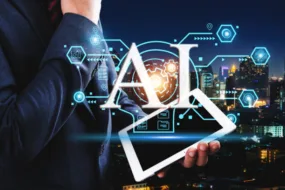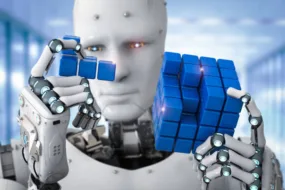Gig economy:

The popularity of the gig economy has surged in recent years. This economy mainly involves short-term contract-based work. Platforms such as Uber, Upwork, and Fiverr connect businesses with independent workers for various tasks. The introduction of artificial intelligence (AI) has further transformed this dynamic landscape.
AI, with its ability to analyse vast amounts of data and make complex decisions, is impacting the gig economy in several ways. Let’s delve into how AI is transforming the world of gig workers and businesses alike. Let’s understand what the gig economy is all about and how it works.
Read More: 5 Essential Skills You Need To Become An AI Expert
What is the gig economy, and how does it work?
The gig economy is a way of working that focuses on short-term, contract-based work rather than traditional permanent employment. People who participate in this are called gig workers, and they often find work through online platforms that connect them with businesses or clients.
Here’s a breakdown of the key points:
i. Temporary and Contract-Based: Jobs in the gig economy are typically not full-time positions with benefits. They can be one-time projects, short-term assignments, or freelance gigs.
ii. Online Platform: Many gig workers find work through online platforms that connect them with businesses or clients. These platforms can be for ride-sharing (like Uber or Lyft), deliveries (like DoorDash or Postmates), freelance services (like Upwork or Fiverr), or microtasks (like Amazon Mechanical Turk).
iii. Flexibility and Freedom: The gig economy’s key attraction is the flexibility and freedom it offers. Workers can choose their hours, work on projects that interest them, and control their workload.
The gig economy has grown significantly in recent years and is expected to continue to grow as AI plays an even bigger role.
AI-Powered Job Matching in the Gig Economy: Finding the Perfect Fit

One of the biggest challenges gig workers face is finding consistent, relevant work. AI can help by streamlining the job-matching process. Here’s how:
i. Skills and Experience Matching: AI algorithms can analyse a worker’s profile, including skills, experience, and past performance data, to identify the most suitable gigs. This ensures workers are matched with jobs they can excel at, leading to higher-quality work and client satisfaction.
ii. Location and Availability: When recommending gigs, AI can consider a worker’s place of residence and availability. This helps businesses connect with workers who are geographically close and available for the project timeframe, maximising efficiency and reducing wasted time.
iii. Predictive Analytics: AI can analyse historical data to predict future demand for specific skills in the gig economy. This allows platforms to proactively recommend relevant skill development opportunities for workers, ensuring they have the necessary skill sets to stay competitive in the ever-evolving job market.
AI and Automation: Reshaping the Gig Economy Landscape
While AI creates new opportunities for gig workers, it’s also leading to automation in certain sectors. AI-powered tools and machines are taking over repetitive tasks previously handled by humans. This automation can impact the gig economy in two ways:
i. Task Replacement: AI-powered automation may eliminate some gig tasks, such as data entry or content moderation, reducing the need for human labour.
ii. Task Augmentation: For many tasks, AI can act as an assistant, automating mundane aspects while allowing human workers to focus on higher-level cognitive tasks requiring creativity, critical thinking, and problem-solving.
This shift towards AI-powered automation highlights the importance of continuous learning and skill development for gig workers. By focusing on acquiring high-demand skills that complement AI, workers can stay relevant and competitive in the evolving gig landscape.
The Advantages of AI-Powered Job Matching in the Gig Economy
AI has one of the most significant impacts on job matching. Traditionally, gig workers rely on browsing platforms and competing for jobs. Artificial intelligence algorithms are changing this by analysing worker skills, experience, location, and past performance data. This allows for a more targeted approach, connecting workers with the jobs they’re best suited for and businesses with the talent they need.
1. For workers, AI-powered matching can lead to:
i. Increased Efficiency: No more sifting through irrelevant jobs. AI can personalise job recommendations, saving time and effort.
ii. Improved Income Potential: Matching skills with the right gigs can lead to higher pay rates and a steadier stream of work.
iii. Greater Skill Development: By recommending relevant gigs, AI can help workers expand their skills and become more competitive.
2. Businesses also benefit from AI matching.
i. Reduced Costs: Artificial intelligence can streamline the hiring process, saving time and resources spent screening applicants.
ii. Improved Project Quality: Matching the right workers with the job ensures that businesses get the skills and experience they need for successful project completion.
iii. Enhanced Client Satisfaction: When projects are delivered efficiently and with high quality, client satisfaction is likely to improve.
However, AI matching also raises concerns.
i. Bias and discrimination: If training data is skewed, AI algorithms can perpetuate existing biases in the workforce.
ii. Loss of Control for Workers: Over-reliance on AI algorithms could limit worker autonomy and control over choosing jobs.
Read More: How AI is Revolutionising the Job Market
Exploring AI and the Gig Economy Worker Management: Efficiency and Optimisation

Platform efficiency and worker satisfaction are crucial aspects of a healthy gig economy. AI can play a significant role in both areas.
i. Performance Management: AI can analyse data on worker performance, including completion rates, client feedback, and turnaround times. This data can be used to provide constructive feedback to workers, identify areas for improvement, and ensure consistent quality of service.
ii. Dynamic Pay Optimisation: AI can analyse market trends, project complexity, and worker skillsets to suggest fair and competitive pay rates for each gig. This ensures workers are adequately compensated for their skills and expertise while keeping costs manageable for businesses.
iii. Improved Communication: AI-powered chatbots can handle basic inquiries and resolve common issues workers and businesses face. This frees up human customer service representatives for more complex matters, improving communication efficiency and the user experience.
The Personal Connection: AI is Incapable of Replacing Everything
While AI plays an increasingly important role, it’s crucial to remember that the human element remains irreplaceable in the gig economy. Here’s why:
i. Client Relationships: Building rapport and trust with clients is essential for success in the gig economy. AI cannot replicate the nuanced communication and interpersonal skills necessary for fostering strong client relationships.
ii. Creative problem-solving: Unexpected challenges and unforeseen situations can arise during gigs. Human ingenuity and critical thinking are vital for adapting to these situations and finding creative solutions.
iii. Ethical Considerations: Certain gig tasks can lead to ethical dilemmas. Human judgement and complex decision-making are crucial for navigating these situations and ensuring ethical conduct.
Read More: How AI Will Revolutionise Your Freelancing Career
The Future of Work: Preparing for the AI-Powered Gig Economy
The gig economy is constantly evolving, and AI is a major driving force behind this change. Here’s how workers and businesses can prepare for the AI-powered future of work:
For Workers:
i. Embrace Continuous Learning: Develop new skills that complement AI, such as critical thinking, communication, and complex problem-solving.
ii. Build a Strong Online Presence: Showcase your skills and experience on platforms and professional networks.
iii. Become Data-Savvy: Learn how to interpret data and use it to your advantage when negotiating rates and finding jobs.
iv. Advocate for Transparency: Be vocal about your concerns regarding AI-driven decision-making and push for fair and transparent practices.
For Businesses:
i. Invest in Responsible AI: Ensure AI algorithms are unbiased and promote a fair and inclusive work environment.
ii. Focus on Human-AI Collaboration: Design workflows that leverage the strengths of both AI and human workers.
iii. Provide Training and Support: Help workers develop the skills they need to thrive in an AI-powered gig economy.
iv. Maintain open communication. Communicate clearly with employees about how AI is being used and how it impacts their work.
The Role of Governments and Platforms in the Gig Economy

The transformation of the gig economy by AI presents both opportunities and challenges. Governments and platforms have a crucial role to play in ensuring a fair and sustainable future for gig workers. Here’s what they can do:
i. Regulations for Fair Treatment: Governments can create rules to ensure fair treatment of gig workers, including minimum wage standards, access to benefits like health insurance, and protection against discrimination.
ii. Data Privacy and Security: There is a need to implement robust data privacy and security measures to protect worker data collected through AI algorithms.
iii. Transparency in AI Decisions: Platforms should be transparent about how AI algorithms are used to make decisions about job matching, pay rates, and performance evaluations.
iv. Support for Worker Training: Governments and platforms can collaborate on initiatives to provide training and upskilling opportunities for gig workers.
By working together, governments and platforms can create an environment where AI empowers both workers and businesses in the gig economy.
Read More: Exploring the Hilarious World of AI Comedy
Conclusion:
AI is undoubtedly transforming the gig economy. While concerns about automation and job displacement exist, the future is likely to be one of human-AI collaboration. By embracing continuous learning, developing soft skills, and working within a framework of fair regulations, gig workers can thrive in this evolving landscape. The gig economy offers flexibility and freedom, and with the right approach, AI can become a powerful tool for both workers and businesses to achieve success.










